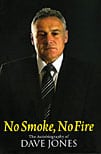 The Autobiography of Dave Jones
The Autobiography of Dave Jones
by Dave Jones & Andrew Warshaw
Know The Score, £17.99
Reviewed by Tim Springett
From WSC 272 October 2009
Football was never the reason for writing this book. That was clear long before Dave Jones said so on page 191 out of 192. Jones states that his motivation was his desire for closure, particularly for his family, ten years after he was initially accused of child abuse while working at the Clarence House children’s home on Merseyside in the late 1980s. What could have been an interesting football history is hence told in somewhat sketchy form, as the story of the charges, the trial and swift acquittal dominates.
Perhaps that is just as well, since the account of his football career is rose-tinted in places, downright boorish in others. His claim that, on arrival at Southampton, he took over an ageing side does not stand up to scrutiny. Matt Le Tissier was, at 26, one of the older members of the team and the previous manager’s parting gift had been 20-year-old Kevin Davies. Jones, conversely, appeared to have a policy of signing players over the age of 30, who commanded high wages yet delivered little, leading to a last-day escape from relegation in 1999. For Saints fans, this was uncomfortably reminiscent of a particularly unpopular former manager, Ian Branfoot. His spells at Wolves and so far at Cardiff are described as a “classic sporting rollercoaster ride” but the Bluebirds’ post-Cup final banquet receives as much coverage as the quarter-final victory at Middlesbrough. Strange.
In contrast to the football, the saga surrounding the accusations – now known to have been fabricated by the “victims” – is provided in emotional detail, with Jones’s wife Ann contributing to the narrative. Hence it is easy to appreciate the effect the case had on his family and, arguably, the need to bring matters out into the open. Given that Jones had the financial resources to hire a top legal team to help him, he may seem less of a victim than others not in a position to mount such an effective defence. But this ignores two important facts.
Firstly, as a manager of a Premier League club, he was forced to live out the entire saga in public. While he had become accustomed to the media spotlight, the same cannot be said of his wife and four children. Secondly, had he not had such a public profile, the accusations might never have been made in the first place, given that the aim was to win compensation. A further point is that Jones’s acquittal led to the quashing of jail terms handed to two other former Clarence House employees and the ending of Operation Care.
Jones is clearly having difficulty drawing a line under the events of ten years ago and this is not helped by the persistence of a very small number of “fans” in hurling insults at him. It is to be hoped that this book will expedite that process.